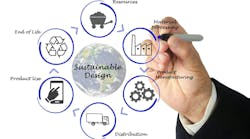Getting smarter with environmental, social and governance initiatives
In a few weeks, we connect with environmental, social and governance (ESG) experts for the webinar "New Techniques To Use ESG And Automation To Unlock Your Competitiveness." Today, we chat with the presenters—Plex Systems' Anthony Murphy and Gerry Abbey—to preview their presentation and discuss new automation efforts and changing the mindset around governance. Take a look…
Smart Industry: ESG is often considered a burden. What is one example of changing this mindset and turning it into an actual revenue generator?
Anthony: There are a handful, but a few major factors are driving ESG as a necessity, but also as a competitive advantage. Consider...
Employees / recruiting—Manufacturing has been battling skilled labor shortage for years; the pandemic and several other exogenous events, including workforce dynamics, have just accelerated it. Having access to the best talent is what will set manufacturers apart. An ESG policy allows employees to connect to the mission of the company.
Customers—More and more companies are requiring a thoughtful ESG plan as a requirement to do business. Having an ESG plan in place will not only support you when you are required to have one to win a bid, but also show that you are a forward-thinking company—in the 'nice-to-have' section of the RFP. In addition to doing good, it's about getting ahead.
And, having an ESG policy and plan means you have been thoughtful about your footprint, your risk, and liabilities and can effectively mitigate them, saving cost and time from downstream issues (e.g. environmental issues).
Gerry: I couldn't agree more with Anthony. ESG as a mindset is one of the biggest difference-makers in business right now. Accenture (along with many other firms) has run long-term studies to quantify the impact of ESG policy on business. One Accenture study analyzed firms over a decade and found that those with sustainability/ESG policies in place tended to score 2.6 times higher on total shareholder return than lower ESG performers.
My general takeaway is that if you are dedicated enough to your business initiatives to have a formalized approach to sustainability/ESG, you are likely to have that same thoughtful approach throughout your business, and I see two major impacts. One, you're going to be more successful because your planning and operations are typically more focused and accountable. Two, your employees feel greater transparency, direction and purpose in what they are doing. This two-pronged impact feeds long-term value that builds upon each success. Going back to the question here, think about your approach to manufacturing and business in general. If you are looking at ESG as a burden, how does that translate to other areas of your business? What message does that send to your company/employees?
Smart Industry: How is governance--that G in ESG--changing as digital transformation matures in manufacturing?
Anthony: It's becoming more pronounced and more prevalent. Industry trends toward more governance and regulation, whether it's in compliance, customers or community. The more digital transformation in the industry, the heavier the 'G' requirements will become. Having your own digital solutions in place across all facets of the business will provide agility and adaptability and allow you to quickly comply to any changing governance requirements. The more digital processes you drive as a manufacturer, the further ahead you are of the competition.
Gerry: I find that being ahead of the curve makes it far easier to run a business. Digital transformation is here and will continue to mature and the earlier you're able to begin adapting your business, the easier it will be for your employees to buy into that change. It's also important to be mindful of what digital transformation means to your business and how governance will evolve with it. DX is not simply getting one or two technologies up and running, but truly transforming as an organization...removing silos and connecting data and people in one place. By doing this, governance—and the expectations around it—becomes far easier, far more transparent across the organization. This transparency empowers people to speak up and contribute ideas for improved processes and to point out where things are not working optimally.
Smart Industry: What most excites you about these smart approaches when it comes to the near future of automation initiatives?
Anthony: Their ubiquity and overall benefit to the manufacturer. If you look at what manufacturers called 'over-hyped' technology two years ago and compare that to what's being adopted today, you'll find that what was previously over-hyped is now table stakes.
These technologies allow manufacturers to be prepared for whatever comes next, whether it's new competitors, global supply chain shortages, or pandemics, or new products, or policy shifts. Smart approaches and automation allow manufacturers to be healthy, agile and able to respond to whatever comes at them.
The really interesting thing is how the barrier to entry has lowered—cost and required technical expertise have been lowered and smart approaches and automation can be done in low-code environments by business users, allowing them to be deployed quickly, cost-effectively and deliver fast time to value (ROI).
Gerry: The capabilities and the opportunity for advancement and collaboration excite me. We recently published our annual report on the State of Smart Manufacturing, which gathered peer insight from 321 global manufacturers. Of the many insights that came out of this, the impact from the pandemic was one of the most powerful. For years, manufacturers have been retrofitting solutions to deal with supply chain disruption, the skilled-labor shortage, and cybersecurity/risk mitigation. But these piecemeal solutions can't cut it any longer.
The wide-reaching impact of the pandemic forced manufacturers to use the best solutions at hand to solve their problems, which also happened to be a longer-term approach to solving these problems because they invested in technology that could adapt and grow as problems change and their businesses evolved.
Manufacturers are identifying the repetitive tasks that can be automated and creating new roles or modified roles that are more attractive for the labor force that's out there. Data is becoming more and more integral to running a business and adopting smart manufacturing and implementing automation is delivering real-time insights into improved business efficiencies, cost savings, and other business improvements.




